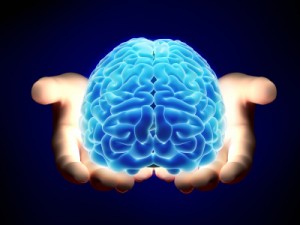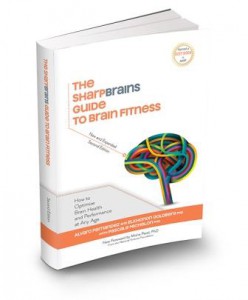The Ten Habits of Highly Effective Brains
 Let’s review some good lifestyle options we can all follow to maintain, and improve, our vibrant brains.
Let’s review some good lifestyle options we can all follow to maintain, and improve, our vibrant brains.
1. Learn more about the “It” in “Use It or Lose It”. A basic understanding will serve you well to appreciate your brain’s beauty as a living and constantly-developing dense forest with billions of neurons and synapses.
2. Take care of your nutrition. Did you know that the brain only weighs 2% of body mass but consumes over 20% of the oxygen and nutrients we intake? As a general rule, you don’t need expensive ultra-sophisticated nutritional supplements, just make sure you don’t stuff yourself with the “bad stuff.”
over 20% of the oxygen and nutrients we intake? As a general rule, you don’t need expensive ultra-sophisticated nutritional supplements, just make sure you don’t stuff yourself with the “bad stuff.”
3. Remember that the brain is part of the body. Things that exercise your body can also help sharpen your brain: physical exercise enhances neurogenesis, at any age!
4. Practice positive, action-oriented thoughts until they become your default mindset and you look forward to creating something beautiful every new day. Too much stress and anxiety–either induced by external events or by your own thoughts–actually kills neurons and prevent the creation of new ones. 
5. Thrive on Learning and Mental Challenges. The point of having a brain is precisely to learn and to adapt to challenging new environments. Once new neurons appear in your brain, where they migrate and how long they survive depends on how you use them. “Use It or Lose It” does not mean “do crossword puzzle number 1,234,567”. It means, “challenge your brain, and often, with novel activities”.
6. We are (as far as we know) the only self-directed organisms in this planet. Aim high. Once you graduate from college, keep learning. Once you become too comfortable in one job, find a new one. The brain keeps developing ALWAYS, reflecting what you do with it.
7. Explore, travel. Adapting to new locations forces you to pay more attention to your environment. Make new decisions, use your brain.
8. Don’t Outsource Your Brain. Not to media personalities, not to politicians, not to your smart neighbour… Make your own decisions, and mistakes. That way, you are training your brain, not your neighbour’s.
9. Develop and maintain stimulating friendships. We are social animals, and need social interaction. Which, by the way, is why ‘Baby Einstein’ or all those educational apps have been shown not to be the panacea for children development.
10. Laugh. Often. Especially to cognitively complex humor, full of twists and surprises. Better, try to become the next Jon Stewart.
Now, remember that what counts is not reading this article –or any other– but practicing a bit every day until small steps snowball into unstoppable, internalized habits. “Cells that fire together wire together”… so, start working on one of these 10 habits today. Revisit the habit above that really grabbed your attention, and make a decision to try something different right away.
 –> To learn more about what you can do, check out The SharpBrains Guide to Brain Fitness: How to Optimize Brain Health and Performance at Any Age.
–> To learn more about what you can do, check out The SharpBrains Guide to Brain Fitness: How to Optimize Brain Health and Performance at Any Age.



Nice read, I agree with a lot of these points
Additionally, I find I can concentrate far better after some exercise than after a big meal. Makes a big difference what the rest of the body is doing when you’re trying to think.
My favorites are: practice positive, future-oriented thoughts; thrive on Learning and Mental Challenges & Develop and maintain stimulating friendships.
Nice post.
ah…the good life. so easy to do when you don’t have to worry about war and poverty and “stuff”…
nice post.. thanks..
Rasy, Eddie, Onasis Jv, Wildan: thanks for your visit, and comments.
Eddie: great observation.
Onasis: you picked 3 nice ones-happy that you enjoy them.
JV: I have worried a lot about hunger, poverty, injustice, and “stuff”. Now I try to focus on what I can DO to help solve or alleviate those problems. Simply worrying doesn’t help anyone, neither you nor them. I think what role I can play to be part of the solution. And act. Start small, and let it grow.
Regarding number 2, I wondered beyond fish and maybe gingko what might be deemed nutrition for the brain…
We answered a similar question recently:
Question:
— Are there herbal and vitamin supplements that will protect my memory?
Key Points:
- Omega‑3 and omega‑6 fatty acids found in cold-water fish may be helpful to long term brain health.
— Folic acid may also be helpful to both cognitive function and hearing.
— Ginkgo biloba and DHEA do not appear to help your brain.
— There is still more research to be done and never dismiss the placebo effect!
https://sharpbrains.com/blog/2007/02/22/are-there-herbal-and-vitamin-supplements-that-will-protect-my-memory/
Also, we summarized some of the findings regarding nutrition:
- Eat a variety of foods of different colors without a lot of added ingredients or processes
— Plan your meals around your vegetables, and then add fruit, protein, dairy, and/or grains
— Add some cold-water fish to your diet (tuna, salmon, mackerel, halibut, sardines, and herring) which contain omega‑3 fatty acids
— Learn what a portion-size is, so you don’t overeat
— Try to eat more foods low on the Glycemic Index
— If you can only do one thing, eat more vegetables, particularly leafy green ones
https://sharpbrains.com/blog/2007/04/11/easy-steps-to-improve-your-brain-health-now/
But, in short, we like the advice given in the Dana Guide to Brain Health, that the general rule here is that what is good for the body is also good for the brain, and to be wary of diets advertised as “brain food”.
https://sharpbrains.com/blog/2006/12/30/the-dana-guide-to-brain-health-book-review/
Yes, I can agree with much of this. Particularly with the segments ‘learn’, ‘explore,travel’ and ‘laugh often’.
This article is loaded with grammatical & factual errors and typos yet I am supposed to take advice about intelligence from it?
“the brain only weights 2% of body mass”
- if grammar is your weakness, use the grammar checker in ms word. this does not look good when lecturing the world on intelligence.
“We are (as far as we know) the only self-directed organisms in this planet.”
- really? are all the other organisms directed by something other than their own instincts?
“Stress and anxiety, no matter whether induced by external events or by your own thoughts, actually kills neurons and prevent the creation of new ones.”
- do you have a citation for this dubious claim?
“try to become the next Jon Stewart”
- i thought we weren’t supposed to outsource our brains.
Does doing arm workouts in my chair while reading science blogs help my brain like double?
I like the part about keeping the process of learning going after college. So many folks I know think their learning is complete and consider reading news or watching documentaries the same as all the learning they’ve done up to that point. Gotta keep the grey matter in top shape!
Levi: most likely… especially if you read the Neurophilosopher’s posts often.
Jerry: you are not “supposed” to do anything. I have written this article. You have found it. If you enjoy it, be my guest. If you give me feedback, I will improve. If you don’t like it, so be it. Note that I don’t use the word “intelligence” but “habits”, because we are not talking about being smart or not, but simply about doing our best, learning, adapting.
On the 3 specific points you raise: there are no factual errors. May I suggest that you pay more attention to the substance than to one typo? (Your choice).
1) Humans are not directed (influenced, yes) by instincts. Our larger and better connected frontal lobes allow us to make our own, meaningful, decisions and plan in life, beyond the influence of our genes and cultural environment (what you can say our “instincts” are). You may enjoy this post on the role of the Frontal Lobes and Executive Functions using a Bill Gates’ speech as example
https://sharpbrains.com/blog/2007/06/16/on-bill-gates-harvard-commencement-speech-and-his-frontal-lobes/
and also this post based on Richard Dawkins’ The Selfish Gene
https://sharpbrains.com/blog/2007/06/17/richard-dawkins-and-alfred-nobel-beyond-nature-and-nurture/
2) Stress and anxiety:
BBC article titled Stressful Event Kills Brain Cells
http://news.bbc.co.uk/2/hi/health/6442001.stm
Our colleague Caroline wrote recently about the science behind: Dr. Robert Sapolsky, in an interview about his book Why Zebras Don’t Get Ulcers, points out that humans uniquely “can get stressed simply with thought, turning on the same stress response as does the zebra. But, the zebra releases the stress hormones through life-preserving action, while we usually just keep muddling along, getting more anxious by the moment.
Prolonged exposure to the adrenal steroid hormones like cortisol, released during the stress response, can damage the brain and block the formation of new neurons in the hippocampus, which is the key player in encoding new memories in your brain. Recent studies have shown these neurons can be regenerated with learning and environmental stimulation, but while short-term stress may improve attention and memory, chronic stress leads indirectly to cell death and hampers our ability to make changes and be creative enough to even think of possible changes to reduce the stress.
Citations at
https://sharpbrains.com/blog/2007/02/15/are-yoga-and-meditation-good-for-my-brain/
3- “become the next Jon Stewart”: I am not saying you follow him. I am saying you try to become as successful ‑and funny- as him. In your own unique way. Information on laughter and the brain at
http://web.sfn.org/index.cfm?pagename=brainBriefings_humorLaughterAndTheBrain
“Personal Development”: agreed! Learning means acquiring new skills/ mindsets/ perspectives…which goes well beyond “being informed”.
Recent data published shows a measurable short term improvent (approx 6 hours worth after 1 hour) in cognative function after a dose of flax seed or fish oil with Omega 3’s
Hello GMan:
As mentioned in a previous comment, we recommend Omega-3s. I’d like to learn more: can you include a reference to that study? Thanks
hey it’s nice honestly it’s great bt just try to make it a little shorter to look more interesting to read
Shortest: don’t outsource your brain!
I find drinking a lot of water and napping during the day helps keeps my brain sharp, well as sharp as it’s going to get. Thanks for some great tips.
Excellent information. All very good advice on how to keep that brain sharpened. Sleep is also vital for improving memory and concentration.
Hello Steven and Philip, thanks for your additions. Yes, sleep is very important, and well as keeping well hydrated.
Very smart article, full of information on how to keep our master-organ healthy. Thank you.
Have you heard of and tested Superbrain Yoga as a tool to fuel the brain? Great articles have been published as well as a book that explains the science behind the exercise. Great way to keep the brain-body system fit!
Thank you Joe! yes, our “master-organ” deserves our attention :-)
Kim: we haven’t. We have seen scientific papers on the benefits of Yoga, but not of one specific “brand” like that. Could you give us the refereces to look into? Thanks
The stress claim looks to me suspiciously like an over-interpretation of a simply animal study. The stress in the study is severe stress and was exposure of rats to aggressive rats. Death of some newly generated cells resulted (hmm, cell death is also related to learned ‑but now I’m over-extending…). Perhaps we can agree that there’s a wide gap here between the animal model and everyday, complex human environments?
Hello Harry, true, there is a gap. Now, neuroscientists like Robert Sapolsky or Fred Gage are not featuring those distinctions, but our similarities. Our physiologies/ stress response are more similar than one may assume.
Fred Gage reminds us how “Chronic stress is believed to be the most important casual factor in depression aside from a genetic predisposition to the disorder, and stress is known to restrict the number of newly generated neurons in the hippocampus.”
Let me ask you: is depression severe stress? what would you say are depression rates (in humans)?